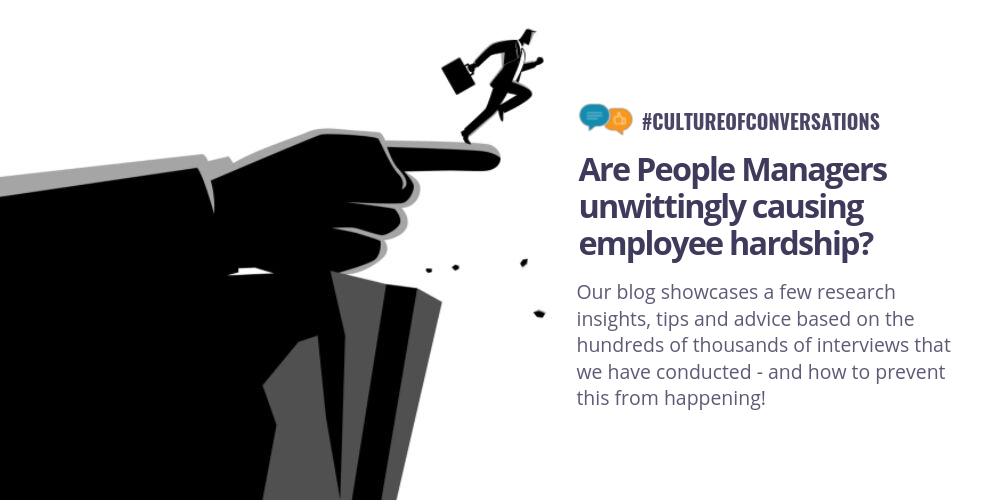[vc_row row_type=”row” text_align=”left”][vc_column][ultimate_spacer height=”20″][vc_column_text]
“My Manager was recently promoted into his role. He has no idea how to deal with people issues. I had some issues I wanted to discuss with him, but he was unable to solve them. I tried for a few months, but since there was no improvement, I decided to look out. I have now got an offer with a 10% increase. I must say I am not happy with this hike, but what else can I do?!”
People Managers are a critical link – the ‘glue’ or even the ‘secret sauce’ – that binds an organisation together. They have a big responsibility towards ensuring that their team works and stays together through the highs and lows of life in an organisation. The verbatim above was received by us while conducting Exit Interviews for a client. We are sure that this quote may seem familiar to you in some form and flavor. It clearly shows that this People Manager needs help to ‘keep his flock together’[/vc_column_text][vc_column_text]We know that nobody wants to become a bad People Manager. Everyone ultimately wants the best for themselves and their team. People Managers want their teams to succeed because it reflects well not only on the team, but on themselves as well!
[/vc_column_text][vc_column_text]However, this does not always pan out as favorably as everyone expects.
We have seen that in many cases, People Managers move into the position of authority over other staff members because the selected candidate was a great Individual Contributor (IC). The person would have performed spectacularly in the individual role before being ‘promoted’ into this level. He moves into this level and realises that the complexities of people management are very different from that of an individual contributor.
This causes stress. Not only is he expected to start delivering results as an individual, he is also expected to return results as a team manager. His role has changed completely and he has no idea where to start. He then begins to try and solve problems himself – because that’s what he is used to. He becomes insulated from the rest of his team and retreats into a shell. None of this happens willingly. It comes from a place of feeling trapped and alone.
This is probably what has happened to the People Manager that has caused his team member to leave.
We believe that there is a clear way to avoid this problem in the first place and to minimise its ill effects in case this situation has arisen already. Needless to say, this becomes a project for not only the Manager’s Manager, but also provides the organisation a chance to re-evaluate its stance vis a vis the process of promotions. Therefore, all levels of the organisation need to be involved in helping People Managers.[/vc_column_text][vc_column_text]
Leadership Teams
- Evaluate your processes –
- Do people on your “Promotion List” spreadsheet really want to become People Managers or are they only interested in moving to the next level?
- What are your expectations from people at this level from a high-level. Questions you can ask:
- What are the goals for the organisation this year?
- What must people be doing in the different Verticals and Horizontals this year?
- How do we plan to plug ‘people capability’ with the objectives of the company this year?
- What specific aspects of our ‘culture’ do we want to promote this year?
- Evaluate your candidates –
- Have the people you’re looking at moving into the People Manager role exhibited the skills that People Managers need to exhibit?
- Are these people really capable of handling the enhanced roles that come with being a People Manager?
- Can these people become ambassadors for your brand culturally?
Middle Management Teams
- Taking on the granular work from the ‘broad strokes’ that the Leadership team has mandated
- Can this person do the job of a people manager or is he being promoted because he is a good IC?
- What are the unique challenges that I face in this team from a business as well as people perspective?
- What skills do I need this new person to bring to the table?
- What kind of work am I going to assign to him that will help me move both him and myself upwards in our careers?
- Person Specific questions:
- Has he displayed any talent for people management in the past?
- What are the gaps in his capability as a people manager that I can train and what are the skills that cannot be trained into him?
- Is he really interested in this role as a People Manager or does is he taking this up with a feeling of “I don’t have a choice. If I want to grow, then I need to become a People Manager”.
- 1. Are there other alternatives for him to grow as an IC?
- 2. Do I need to have a discussion with him to know what he really needs from the organisation to help him grow professionally?
HRBP Teams
Human Resources Teams that enable and manage this process must be fully aware of the candidates and their strengths and weaknesses. Here’s what we believe they can do:- Work closely with People Managers consistently – not just at times when their support is required
- Learn to ‘read between the lines’ when collating inputs and findings after Skip Levels and in One on One meetings with staff members
- Look at Training Need analysis data to identify gaps in capabilities and work on how to bridge those gaps.
- Look at data of high performers and meet with them. See what their career goals are and how the organisation can help them achieve their goals.
- Also look at consistent performers – while this may seem daunting, not all high performers make good People Managers and not all ‘mid-raters’ make bad People Managers.
- Identify ‘culture-fit’ wherever possible in top talent by discussing the talent capabilities with Vertical and Horizontal Heads of Departments.
Our Employee Survey Suite can help you identify your employees’ state of mind and attitude towards this process and give you an insight on what you are dealing with.
[/vc_column_text][/vc_column][/vc_row]






